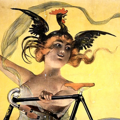bookwyrm_user reviewed Norse Mythology by Neil Gaiman
Accessible
4 stars
I'm not sure what I was expecting, but I wasn't expecting this. It's an easy read and I flew through it. It's basically a collection of short stories, with recurring protagonists, gods and friends. The language is easy and has a modern feel, but it does a good job. It gives a sense of storytelling that does justice to the oral tradition these stories came from. The stories themselves are very fairy tail like, which I found interesting. The stories are short though, and they left me wanting for more.
I'm not sure what I was expecting, but I wasn't expecting this. It's an easy read and I flew through it. It's basically a collection of short stories, with recurring protagonists, gods and friends. The language is easy and has a modern feel, but it does a good job. It gives a sense of storytelling that does justice to the oral tradition these stories came from. The stories themselves are very fairy tail like, which I found interesting. The stories are short though, and they left me wanting for more.










